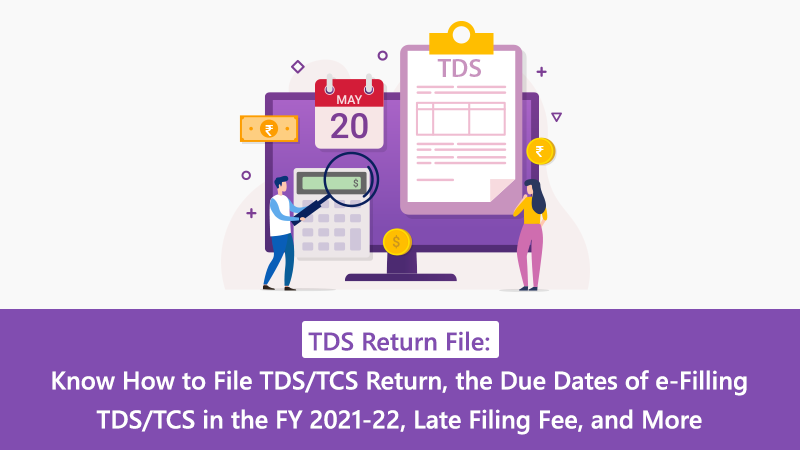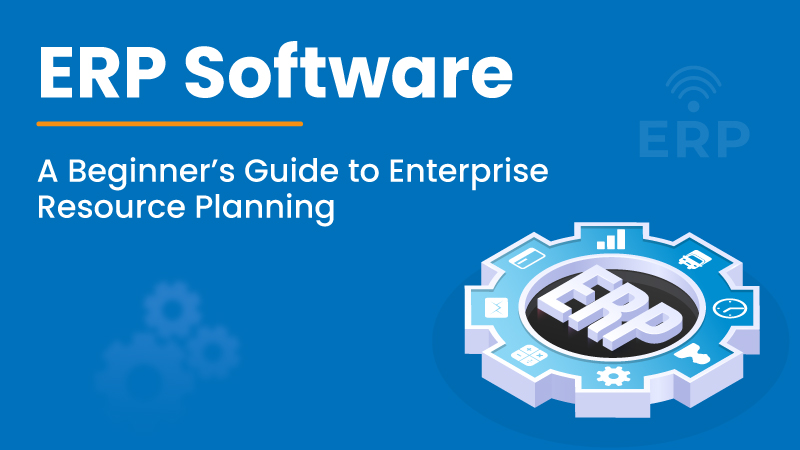TDS Return File: Know How to File TDS/TCS Return, the Due Dates of e-Filling TDS/TCS in the FY 2021-22, Late Filing Fee, and More

A long time ago taxes were levied on imported goods, later on, it was imposed on real property to raise the funds for the country and it’s been confined for a long time. But as demand increased with requirements, tax collections were extended to other assets like real estate, a variety of obligatory services, charges on goods, industries, market fees, and so on. Since then, with the advancement of civilization, various types of taxes have been imposed on citizens and industries as per their reciprocal obligations and duties. In the procession, TDS and TCS are one of the kinds of taxation that the Government has imposed on eligible taxpayers of India.
What Are TDS and TCS?
Tax Deducted at Source (TDS) is a mechanism introduced by the Income Tax Department with the aim of collecting taxes from the source of income generation. As per this concept, the responsible person (deductors) is required to deduct a certain percentage of income as tax before making the payment to the receivers. The deductor is liable to deduct tax on payments which include salary, commission, brokerage fee, professional fees, interest, rent, etc. subject to the terms and conditions specified in the relevant sections. TDS deducted is required to be paid to the income tax department by the payer/deductor on a relevant date as specified.
Tax Collected at Source (TCS) is a mechanism wherein the responsible person (seller) is required to collect a certain percentage of the amount as tax from the buyers at the time of sale of specific goods. TCS collection is applicable to the sale of certain goods which is excluded from production and manufacturing material.
What Is TDS/TCS Return Filing?
Tax Collected at Sources/Tax Deducted at Source must be deposited on or before the due dates prescribed under the Income-tax Law. Along with depositing the TDS, the deductors also need to file a TDS/TCS return that is basically a quarterly statement consisting a summary of all entries for tax deducted by the deductor and paid to the Income Tax Department. It is mandatory for all TDS deductors to submit their TDS return on or before prescribed due dates. TDS return can be filed only with valid Tax Collection and Deduction Account Number (TAN).
Who All Are Required to e-File TDS Return?
Every Deductor/payer who deducts/collects TDS/TCS with a valid Tax Deduction and Collection Account Number (TAN) is required to file their TDS return. They are as follows:
- All government offices
- Corporate offices/Companies
- Individuals
But In case of payments made u/s 194A, 194C, 194H, 194I, and 194J, individual and HUF whose accounts are not subject to Tax Audit under section 44AB of the Income-tax Act, 1961 during the preceding financial year, are not required to deduct tax at source.
What Are the Types of TDS/TCS Returns?
There are various types of TDS/TCS return forms based on the nature of payments to be filed by deductors/payers with valid TAN.
|
Form 24Q |
TDS Deducted on Salary |
|
Form 26Q |
TDS deducted on payments other than salary |
|
Form 27Q |
TDS deducted and collected from non-residents payment (other than salary) |
|
Form 27EQ |
Quarterly statement of Tax Collected at Source |
|
Form 26QB |
A return-cum-challan form for the payment of Tax Deducted at Source (TDS) to the Government |
|
Form 26QC |
Challan-cum-statement form for reporting the transactions liable to TDS on rent |
|
Form 26QD |
Challan-cum-statement form for reporting the transactions liable to TDS on PAYMENTS TO Resident Contractors and professionals |
Due Dates of e-Filing TDS/TCS for Financial Year 2021-22
TDS/TCS returns are required to be submitted on a quarterly basis. Noting that, for the first three quarters, deductors/payers are given one month to file TDS/TCS return whereas, for the fourth quarter (1 January to 31 March), deductors are given 2 months to submit their TDS/TCS return. Take a look at the due dates of the TDS/TCS return file.
Also Read: A Step by Step Guide to Filing e-TDS Returns Online
Due Dates for the Payment of TDS (other than 194IA, 194IB)
|
Deductors |
Payment Type |
Due Dates of Payment of TDS |
|
Government Office |
Without challan |
Same day |
|
Government office |
With Challan |
Before or 7th of next month |
|
|
|
|
|
Other than government office |
March month |
30th April |
|
Other than Government Office |
Other month |
7th of next month |
TDS Return Due Dates for FY 2021-22
|
Quarter |
Duration |
Last Date of Filing |
|
1st Quarter |
1st April to 30th June |
31st July 2021 |
|
2nd Quarter |
1st July to 30th September |
31st Oct 2021 |
|
3rd Quarter |
1st October to 31st December |
31st Jan 2022 |
|
4th Quarter |
1st January to 31 March |
31 May 2022 |
Due Dates for the Payment of TDS u/s 194IA and 194Ib
|
Form Types |
Payment types |
Due Dates |
|
Forms 26QB (Challan cum TDS return) |
TDS on Immovable property |
30 days from the end of the month in which TDS was deducted |
|
Form 26QC (Challan cum TDS return) |
TDS on rent |
30 days from the end of the month in which TDS was deducted |
|
|
|
|
TCS Return Due Dates for FY 2021-2022
|
Quarter |
Duration |
Last Date of Filing |
|
1st Quarter |
1st April to 30th June |
31st July 2021 |
|
2nd Quarter |
1st July to 30th September |
31st Oct 2021 |
|
3rd Quarter |
1 October to 31st December |
31st Jan 2022 |
|
4th Quarter |
1st January to 31st March |
31h May 2022 |
What Is TDS Refund?
When the TDS amount is higher than the net payable tax, the taxpayers need to file a TDS Refund Claim for the additional amount deducted by an employer. In simple terms, if deductors deduct TDS more than your annual tax liabilities, you need to file an income tax return to claim such excess TDS as a refund. Basically, the case of TDS refund arises when there is a mismatch between investment declared at the beginning of the financial year and investment made at the end of the financial year.
Also Read: A Complete Guide on Tax Deducted at Source (TDS)
When Can You Claim a TDS Refund?
- Your employer deducts more tax than total taxable income
- Your income is below than tax slab and tax is deducted on interest income of fixed deposits and bank accounts.
- You are a senior citizen and tax is deducted on the interest income from fixed deposits.
How to File TDS/TCS return?
- Visit the website https://www.tin-nsdl.com/services/etds-etcs/etds-rpu.html. Make sure you have selected the tab eTDS/e-TCS RPUfrom the menu on the left side.
- Download RPU version 5. This Preparation Utility is updated quarterly, so make sure you are downloading the file each time wheneveryou file the return.
- Extract files from the Downloaded Zip File and choose the file TDS_RPU 3.5(the file you have downloaded may have a different version).
- You need to install the following software visible in the pop-up window on your PC to open the file TDS_RPU_3.5.
- Choose the required form type from the drop-down menu and click Continue to create a new file.
- Fill in the required details in the chosen form (24Q or other form types) and once done, visit the website https://tin.tin.nsdl.com/oltas/to download the challan file.
- Fill in the required fields and download Challan File from the bottom of the box.
- Once your challan file is generated, visit the income tax e-filing website (https://www.incometax.gov.in/iec/foportal/). Click New Userif you are not a registered user or click Login Here if you are a registered user.
- Enter TAN in the User Id box, password that you have generated, and captcha and click login.
- Once you log in to your account, choose the TDS tab in the dashboard followed by Upload TDSfrom the drop-down menu.
- Choose the appropriate details from drop-down boxes and click
- Here, you need to upload the zip file of TDS statements followed by attaching a digital signature using the DSC management utility. Click Upload once done.
- You can see the onscreen message of successfully uploaded TDS. Your e-token will be generated within 24 hours that you can view in View Filed TDS under the TDS tab.













Late Filing Fee for TDS/TCS Return
As per section 234E of the Income Tax Act 1961, if the taxpayers fail to file TDS/TCS return on or before the due date prescribed under the Income-tax law, they are liable to pay the late fee of Rs. 200 per day until they file the TDS return. However, the total amount of the late fee can’t exceed the actual amount of TDS i.e. if your total payable TDS amount is Rs.4000 that is to be paid on or before 14th July and you are filing your return on 14th August, you need to pay only Rs. 4000, not the exceeded amount as per calculation that is 30 days * 200 = Rs. 6000. But, for the late deposit of TDS, you have to pay the interest amount under section 201(1A).

Try HostBooks
SuperApp Today
Create a free account to get access and start
creating something amazing right now!
















